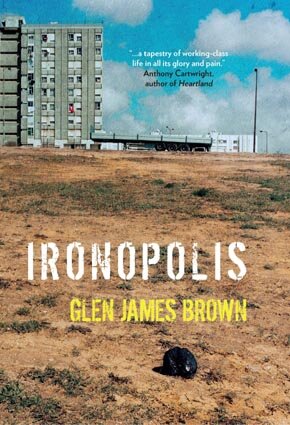I've discussed before how much I enjoy it when novels take the form of interlinked short stories, but the structure of Glen James Brown's debut novel “Ironopolis” is wholly unique in how it not only tells the interweaving stories of several individuals centred around a council estate but does so using different formats from letters to interviews to personal accounts. I've been meaning to read this book since it was first published last year and most recently it's been shortlisted for The Portico Prize (a literary award which celebrates Northern lives and landscape across fiction and nonfiction.) Brown's novel is located in Middlesborough, a city that has gone through large transformations since the closure of its coal and steel industries. These changes are particularly felt by the residents of this estate which undergoes a protracted process of rejuvenation by the local housing association resulting in the displacement of many long-term inhabitants.
Over several decades we follow the lives of many locals including a mother dying of cancer, her bibliophile son, a local artist whose paintings come into vogue, a young man who finds a newfound passion for acid house music while emerging into his sexuality, his sister who grapples with a gambling addiction and her failing hair salon business, an elderly mobile librarian who harbours dark secrets, a petty criminal whose ill-fated meeting with the law sends him into a spiral of paranoid loneliness and a mythical green-skinned woman who dwells in the river and the bottom of a well. These distinct lives are all given a chance to shine individually as their voices gradually emerge, but their experiences powerfully join together in a tapestry to form a richer understanding of this area and its people.
I became really drawn into this novel through its sympathetically-portrayed range of characters and then felt gripped by the many intriguing mysteries and hidden histories buried in their stories. By getting a range of points of view in different narrative forms details surrounding particular dramatic events gradually come to the forefront giving a much more rounded understanding of the characters' motivations and circumstances. Brown has an impressive ability for startling the reader with revelations that they didn't even realise they were expecting. What resonates most powerfully is the broad empathy extended to numerous working class individuals whose voices often go unheard or are actively ignored. “Ironopolis” is a moving tribute to them and stands as a dynamic account of a recent era whose story has been paved over in the name of progress.











